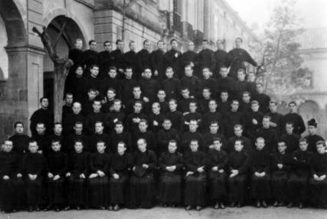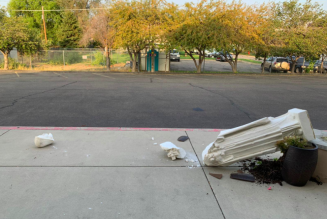
Thanks, graduates, for inviting me to address you on this momentous occasion. Congratulations, graduates, and Godspeed as you launch.
All of you moms and dads, husbands and wives, son, daughters, other family, friends: Be proud of this crew. The fact they’re here means that we as a faculty have signed off on them as being ready to serve you — serve us all — as nurses.
Some already do — the ones who’re graduating with degrees beyond their original nursing training — but the others will have to wait for the state to weigh in before they can serve as RNs. Keep praying for and supporting the whole lot, but especially this latter group. They have one more hurdle to get over: The infamous (cue the dramatic music) state board exam! Regardless, know that we stand behind them all, and we know you will, too.
And that’s no small thing these days, because, well … okay, let’s just get it out of the way: “We live in unprecedented times.” Aren’t you sick of hearing that? I know I am. But, alas, it’s true, and it can’t help being the backdrop of a nurse pinning ceremony in the midst of a global pandemic.
I’ve been to many a graduation, many a pinning in my day, and I’m telling you, this one is different. Clearly, each pinning is different in the sense that each year’s graduating class is different, but that’s not what I’m talking about.
What I’m talking about is this particular class at this particular time. It’s never been easy to go into nursing — to take up this profession of service and sacrifice — but it’s a particularly challenging moment to be a nurse. The healthcare sector is experiencing enormous strain and extraordinary pressures due to the ongoing pandemic, to be sure. But that strain and those pressures were there before the pandemic. And they’ve only gotten worse.
You guys know that — you’re not blind. You’ve seen the stress and the muted morale on the faces of the nurses at clinical. And those of you who are already nurses know some of that firsthand. Yet, here you are, marking a milestone on your nursing journey — either the very beginning or along the way. It’s a journey you embarked on voluntarily, willingly, eagerly. Even now; even in these strange times.
Why? Let’s consider.
No matter when or in what context, I’m guessing each of you experienced some spark of nursing interest years ago that was connected to the idea of care. Some event, some relationship stirred up the inkling: “I’d like to be like that,” you thought. “Maybe I’ll be a nurse.” When was that for you? Remember?
Maybe your mom was a nurse, or an aunt, and you heard about what they did, how they did it. Maybe you witnessed how nurses cared for you or your family members at some point. Maybe in high school, during a career fair, you talked to a nurse, or you got to shadow one at the hospital. Or perhaps it was TV, movies or a hospital series you binged on Netflix: High-adrenalin images of nurses on the run, heroic patient interventions, making a difference, saving lives.
All those nursing prompts — even those high-action movie scenes — revolved around a simple core of caring the other,serving the other, sacrificing for the other. It was an idea that has probably been tempered by your actual experience of real patient care: The critical thinking and complexity, the treatments and assessments and med administration; interpreting labs and vital signs and subtle status changes; knowing what to do, when to do it, and for what reason. Not to mention the new admission that arrives at the very end of your shift.
Somehow, though, in the midst of all that complexity — all those tasks and duties — you’ve held on to care as your nursing core. And for good reason.
Remember those nursing prompts I listed earlier? The glimpse of nursing you likely had that set you off on this path, whatever form it took? I’ll bet it wasn’t some nurse giving shots or taking blood pressures that you found so inspiring, was it?
No, it was something else — something less concrete, something subtler. A manner of speech, a willing ear; a look, a touch, a presence; a Christlike offering of self in the midst of ordinary duties. These are things we can’t teach in nursing school. They’re dimensions of a nursing character that grow within you as you pursue the profession and begin practicing it. For so many nurses, it’s rooted in faith; even if it’s not, it’s something that simply is in you.
That’s why I’ve chosen a song as my parting gift to you.
It’s from the Shakers, a religious sect with Christian roots that emerged back East in the 1700s and had its heyday in the 1800s.
They’re known for their “shaking and quaking” dance rituals — hence their nickname — and also their simple living, especially their minimalist furniture.
But the other legacy of the Shakers is a hymn, “Simple Gifts.” It goes like this:
’Tis the gift to be simple, ’tis the gift to be free
’Tis the gift to come down where we ought to be,
And when we find ourselves in the place just right,
’Twill be in the valley of love and delight.
When true simplicity is gained,
To bow and to bend we shan’t be ashamed,
To turn, turn will be our delight,
Till by turning, turning we come ’round right.
This song gives us an excellent framework for recalling why we’re nurses — why we’re doing this job, especially now. For example, it truly is a “gift” to serve as nurses, particularly for Christians. It’s a privilege to “simply” and “freely” care for others in Christ’s name. In fact, as followers of Jesus, serving others is “where we ought to be” all the time, and nursing affords us regular, daily opportunities to practice that virtue — the place “just right,” and one characterized by “love.”
How does it happen? The song tells us: True simplicity is gained when three things happen.
- To bow and to bend: This is literally true — which is why one of your first lessons in Fundamentals was about body mechanics and back safety — but it’s also figuratively true. We’re paid employees, true enough, and we have stuff we gotta get done. Yet we can choose to do that stuff with a servant’s heart — to “bow” to the needs and preferences of our patients; to “bend” our wills to serve, even when it’s disagreeable or inconvenient.
- To turn, turn: This is the clue to how we develop the habit of bowing and bending — that is, we turn, or, in Latin, to “con-vert” to turn around. To convert, to turn around, is at the heart of our Christian faith, and it’s also at the heart of a nursing disposition. True conversion, true turning, isn’t something that happens all at once usually. It can take time and experience, failures followed upon successes followed by failures again. The key is to keep at it, keep converting, keep turning — and “delight” in the turning toward a selfless manner of life.
- To come ‘round right: Coming ‘round right means that we’ve arrived, that we’ve fully turned (con-verted), and no more turning is required. This is a hopeful image in the song, but it’s a long-range goal, and it’s not going to happen in your nursing career — nor in life for that matter. There’s always more to learn; always more crud and selfishness to root out of our souls; always more turning toward love that we can do.
That sounds harsh, I know, but it’s truth. However, here’s some more truth: We have assurance that we can and will come ‘round right in God’s time if we refuse to give in, give up, give way to whatever keeps us from turning again and again. And nursing, I’m telling you, is a superb master class in continual turning.
One last thing about this song: The bowing and bending, the turning and turning, the coming ‘round right. I said earlier that the Shakers included dance in their rituals, and this song clearly reflects that. Here, too, I think it helps highlight an important nursing ideal, for, at its core, nursing is care, and caring is a dance, with ups and downs, rhythms and reels — balance, that is, and harmony.
So, please consider learning this little song and maybe sing it in your car on your way to work. Or just hum it to yourself when things get tough on your shift. Things will get tough, my nursing friends, they will get complicated, but you can persevere with joy if you hold on to the simple things.
Join Our Telegram Group : Salvation & Prosperity









